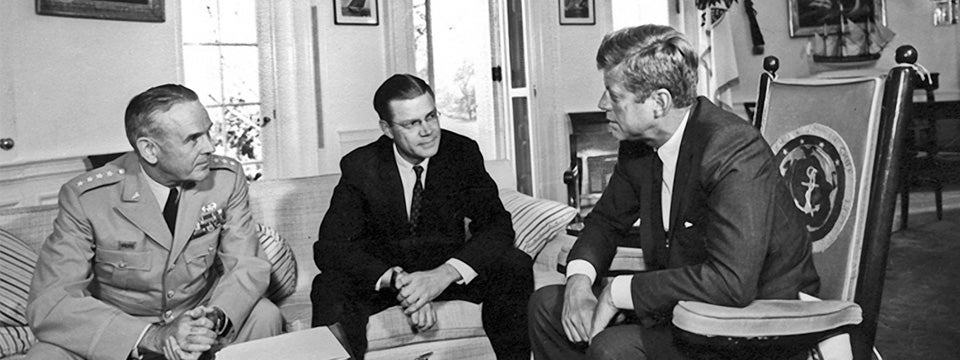New AUSA book highlights controversial Cold War leader
New AUSA book highlights controversial Cold War leader
Gen. Maxwell Taylor was one of the most influential military leaders of the Cold War. Among his many roles, he served as the U.S. Army chief of staff, chairman of the Joint Chiefs of Staff, and as the U.S. ambassador in Saigon during the early years of the Vietnam War.
An early skeptic of deterrence, Taylor consistently argued that the nation needed to be prepared for limited war — both conventional and nuclear.
Ingo Trauschweizer, associate professor and director of the Contemporary History Institute at Ohio University, offers an incisive profile of Taylor in Maxwell Taylor’s Cold War: From Berlin to Vietnam. This new entry in the Association of the U.S. Army Book Program tracks Taylor from his command in post-war Berlin to his public critiques of defense policy in the 1980s.
We sat down with the biography’s author to discuss this important and controversial figure.
******
AUSA: Why did you select Maxwell Taylor as the subject for a book?
Trauschweizer: I encountered Taylor in my research on the 1950s (The Cold War U.S. Army). When I started developing new classes on the Vietnam War, the Cold War and American military history, I began using episodes of Taylor’s career to illustrate points about military thought, education, operations, strategy, policy and civil-military relations.
AUSA: In the varied roles of his career, what common themes can be found in Taylor’s thinking about military strategy?
Trauschweizer: I was surprised to discover how soon (certainly by 1948) Taylor came to think in terms of limited war. I had assumed that was the result of his experiences in the Korean War. More broadly, Taylor demonstrated awareness of the need to link military, diplomatic, economic, intelligence and cultural means in order to devise and execute strategy. He did it successfully in Berlin (1949–51) and Korea (1953–55) before falling flat in Vietnam.
AUSA: How would you respond to H.R. McMaster’s depiction in Dereliction of Duty of Taylor during the Vietnam era?
Trauschweizer: I am impressed by McMaster’s research even though I wonder what more forceful advice by chiefs who were inclined to risk war with China would have accomplished. On Taylor’s role in diminishing the influence of the JCS, I am less convinced. Taylor agreed with [President Dwight] Eisenhower’s private assessment of the late 1950s: the committee structure was far from ideal, perhaps even broken. What followed after the Bay of Pigs fiasco was a crisis of confidence—of President Kennedy and Secretary of Defense McNamara in the chiefs (and vice versa)—but that was less new than McMaster suggests.
At the same time, I agree that Taylor was one of the more cautious voices for escalation in Vietnam. He pushed for the use of airpower while hoping to avoid Americanization of the ground war.
AUSA: What lessons can we learn from the book for dealing with Russia and China today?
Trauschweizer: There are questions that remain timely on force structure and strategy/policy. On the former, Taylor’s experiences illustrate the difficulty to prepare for multiple types of warfare, against peer rivals or insurgent groups.On the latter, military officers often seem to substitute operational art for strategy, while civilian leaders provide muddled policy guidance that is then hard to translate into strategy, which ought to be defined by an attainable political objective and by available means.
AUSA: How would you describe Taylor’s legacy for the U.S. Army?
Trauschweizer: It is tainted. He’s seen as a manipulator, careerist and cold-hearted operator. On the other hand, he did help put the U.S. Army on track for its development into a modern force before and after the Vietnam War. What Taylor saw clearly—and what Eisenhower had told him unmistakably—was that the World War II–style Army was near death by 1955.
The wider lesson, to me, is that generals and admirals should consider policy, strategy and operations as a closely integrated system and not get hung up in one of the component pieces alone.
******
To order a copy of Maxwell Taylor’s Cold War: From Berlin to Vietnam, please visit www.ausa.org/books.


